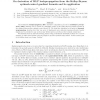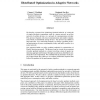102 search results - page 8 / 21 » Optimal gradient clock synchronization in dynamic networks |
IJCNN
2000
IEEE
14 years 17 hour ago
2000
IEEE
The well-known backpropagation (BP) derivative computation process for multilayer perceptrons (MLP) learning can be viewed as a simplified version of the Kelley-Bryson gradient f...
SENSYS
2004
ACM
14 years 1 months ago
2004
ACM
Wireless sensor network applications, similarly to other distributed systems, often require a scalable time synchronization service enabling data consistency and coordination. Thi...
ASPDAC
2004
ACM
14 years 1 months ago
2004
ACM
— The problem of minimizing dynamic power consumption by scaling down the supply voltage of computational elements off critical paths is widely addressed in the literature for th...
DAC
2008
ACM
14 years 8 months ago
2008
ACM
This paper discusses the use of networks-on-chip (NoCs) consisting of multiple voltage-frequency islands to cope with power consumption, clock distribution and parameter variation...
NIPS
2003
13 years 9 months ago
2003
We develop a protocol for optimizing dynamic behavior of a network of simple electronic components, such as a sensor network, an ad hoc network of mobile devices, or a network of ...



